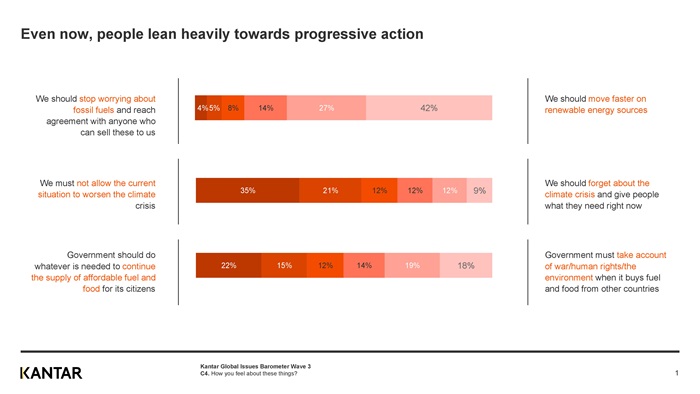After a wild summer in the Global North, 3 significant investigations by Kantar reveal strong feelings on sustainability.
The Sustainability Sector Index reveals across 38 countries and 32 categories, where brands must and can act in sustainability, depending on their category. Who Cares Who Does examines the attitudes of people on Kantar’s shopping panels and matches that to what they actually buy. And the Global Issues Barometer uses open-ended questioning and Text AI analysis to identify what is really on people’s minds.
Three lessons are abundantly clear from every one of these pieces of work.
People are significantly concerned about climate and environment
We have a host of proof points for you but let’s just share a couple. This issue spontaneously concerns more people than inflation does and the number of people expressing that concern as one of their most important issues rose by 50% across the Northern summer, following a host of climate related emergencies such as the floods in Pakistan, crop failures in India, wildfires in Greece and 40 degree temperatures in once temperate England. This issue has broken through. Even in the USA, half the population expresses high concern about this topic and in China, 45% do.
They urgently want something done about it
Whose job is this? Government always has a role but the general public and business are also squarely in the frame with international organizations and the media following behind. So, we are literally all in it together on this one.
79% hold business responsible for environmental degradation – more than any other party. As a corollary, 64% see business as having a large responsibility for solutions. 75% say the general public has a responsibility here so they are not trying to shirk it, but they aren’t sure what they can do that makes a difference.
So, people are willing and we know that when they are trying to lead a more sustainable life, they feel a sense of agency; they feel they can make a difference with their choices and actions, that they are living their values and demonstrating what they believe in. Business and by extension, the brands through which business goes to market, have an opportunity to enable and facilitate this at scale.
Many of them can’t afford to make sustainable choices when they shop
Third - and this is the zinger - in spite of all of this, many of them can’t afford to make sustainable choices when they shop. 78% of people in the global Barometer sample agree they ‘want to buy environmentally sustainable products, but brands will have to make sure I can still afford to do so’. And 64% agree, ‘My concern about the cost of things is getting in the way of me buying eco-friendly products’. Analysis for Who Cares Who Does shows it may indeed be hard to be an actively ‘sustainable consumer’ - the 20 products most chosen by environmentally conscious consumers in the UK trade at a 75% premium to category average prices. That sense of agency we mentioned earlier? That feeling of identification with sustainable values? Well, that is for the affluent. It is far higher amongst people living the most comfortable lives. And good for them; they are putting their money where their principles are but not everyone can do this, and even they are under pressure.
The Global Issues Barometer shows us that very few people are unscathed by the rising cost of living and, as always happens in tough times, they make more exact distinctions between needs and wants, and try not to waste money; not panicking in most cases but exercising prudence. Luxury (however people define that) is vulnerable and if sustainability is priced as a luxury, it will suffer.
So, they are retrenching in some of their buying behaviors, buying less, trading down. Needs must if sustainability is a premium choice. 72% of respondents agreed ‘Although I can’t afford to buy products that are better for the environment and society, it doesn’t mean that I am less concerned about these issues’. Buying is only one behavior, of course (even if it’s the one marketers automatically focus on), and their concerns will find alternative expression in activism, and possibly a deepening mental health crisis, and in other ways.
Because importantly, they are not retrenching in their attitudes. Right now, in countries around the world, governments are debating whether to pause their moves away from fossil fuels and whether climate measures, once again, should take a back seat to short term circumstances. So, it’s interesting to see that their public's see this as a moment to go faster on the transformation, not to pull back. It may be that these demands will be met: a recent report from the International Energy Authority suggests that the energy crisis caused by Russia’s invasion “is in fact going to accelerate the clean energy transition” with peak emissions in 2025. This would be an historic moment, albeit one that still leaves enormous work to do, with the UN currently finding “no credible pathway to 1.5C in place”.
Even under current economic conditions, vast majorities reject suggestions that we should stop worrying about fossil fuels or forget about the climate crisis as some new measures (see graph) show. The only measure on which the scales are more finely balanced is about observing what we might call an ‘ethical foreign policy’ versus doing whatever we have to in order to maintain affordable supplies. Even here a tiny majority falls in favor of taking these ethics into account.
This is not a lobby; this is a mass market.

Currently, far-sighted brand owners are reaping the benefits of their early forays into sustainability with premium priced offers. But there is more than one model of success.
There will always be a premium opportunity here and there will always be products and brands that require or merit a very premium price.
But there is also a mass market model where people who want to buy better can afford to make that choice; where value comes from penetration and volume sales, enabling economies of scale and driving brand equity by meeting needs with meaningful difference. How can we expand our sights from a laudable focus on sustainable consumption to a wider discussion of mass adoption? Because at the moment, you could argue that an industry that prides itself on meeting the needs of its consumers, and spends significant money on understanding those needs, is in fact frustrating one of their most urgently expressed desires. And that’s not what we’re here to do, is it?

